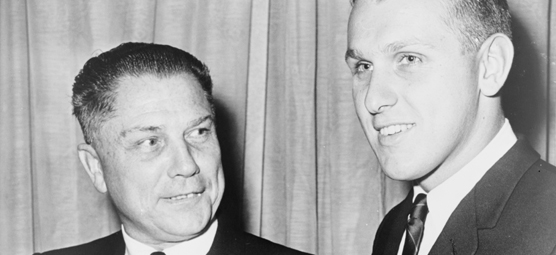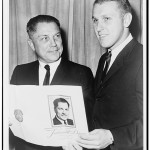Feds agree to reduce oversight of once-Mob-corrupted Teamsters Union

Las Vegas doesn’t have a statue of Jimmy Hoffa, but some folks think it should. Hoffa, the one-time president of the International Brotherhood of Teamsters union, helped steer millions of dollars to Las Vegas for investment in casinos and other projects.
With the Teamsters investments, however, came some big strings: Mob infiltration and sometimes outright control of those properties, including some of the biggest casinos in Las Vegas. Federal and state regulators (and legitimate investors) eventually wrested control of the casinos away from the Mob, but the link between organized crime and the Teamsters led to federal government oversight of the union.
Now, 26 years after the union agreed to court-ordered supervision, the government has agreed to reduce its oversight of the union. The union and federal prosecutors signed a settlement last week that will phase out the supervision in five years.
Preet Bharara, the U.S. attorney for the Southern District of New York, said the Teamsters had made “significant progress” in eliminating corrupt influences, the New York Times reported. Jimmy Hoffa’s son, James P. Hoffa, who is the president of the 1.4 million-member union, said “corrupt elements have been driven from the Teamsters.”
In the 1950s, 1960s and early 1970s, the Mob directed loans from the Teamsters Central States Pension Fund and other funds to casino projects, including the Hacienda, Fremont, Marina, Desert Inn, Caesars Palace, Circus Circus and Stardust – the last of which was a story told in the slightly fictionalized movie Casino, which came out in 1995 and starred Robert De Niro, Sharon Stone and Joe Pesci.
The problem with the loans to the Mob-controlled projects was that many of them were not repaid promptly (or at all), and the corrupting influence facilitated “the skim” – the tax-free diversion of casino cash, delivered in suitcases to Midwestern mobsters. It’s a story told every day at The Mob Museum in Las Vegas.
Federal officials estimate that mobsters skimmed perhaps $300 million from Las Vegas casinos. One of those who supervised and facilitated the skim was Allen Dorfman, Jimmy Hoffa’s administrator of the pension fund. Dorfman (portrayed by Alan King in Casino) was the subject of several government investigations. He was to be sentenced in 1983 for attempting to bribe Nevada Senator Howard Cannon but he was murdered. The Mob feared he would cooperate with the government to avoid decades in prison.
Hoffa himself disappeared and most likely was murdered in 1975 as he attempted to take back control of his union following a prison sentence. Hoffa demanded that the Teamsters’ investments be repaid, but his replacement as president, the Mob-connected Frank Fitzsimmons, was more accommodating to allow the Mob off the hook on the loans.
For all the bad press, spilled blood and lost money, the Teamsters and the Mob helped Las Vegas grow into one of the top entertainment destinations of the world – and those union investments also helped build shopping centers and hospitals.
Feedback or questions? Email blog@themobmuseum.org






